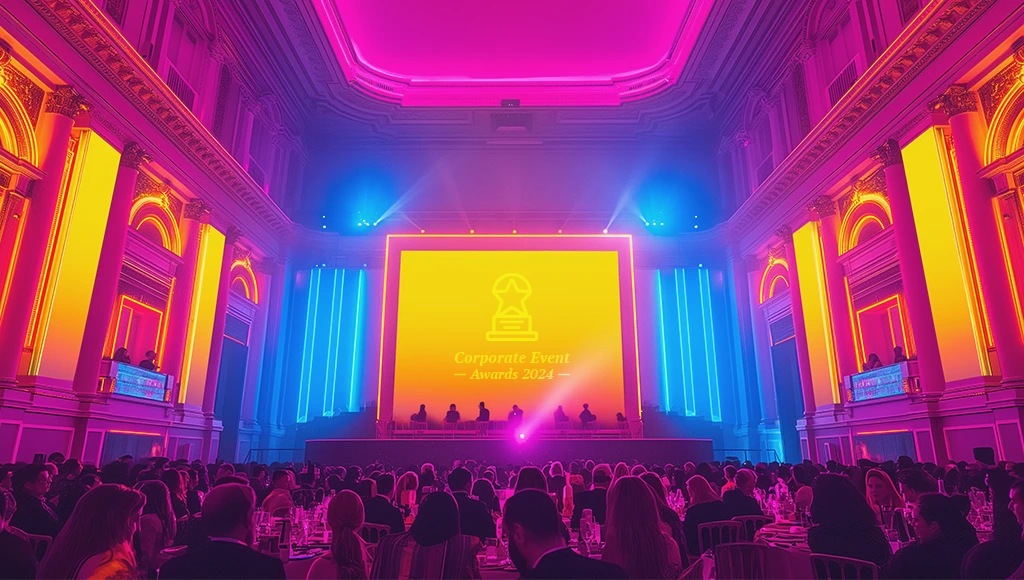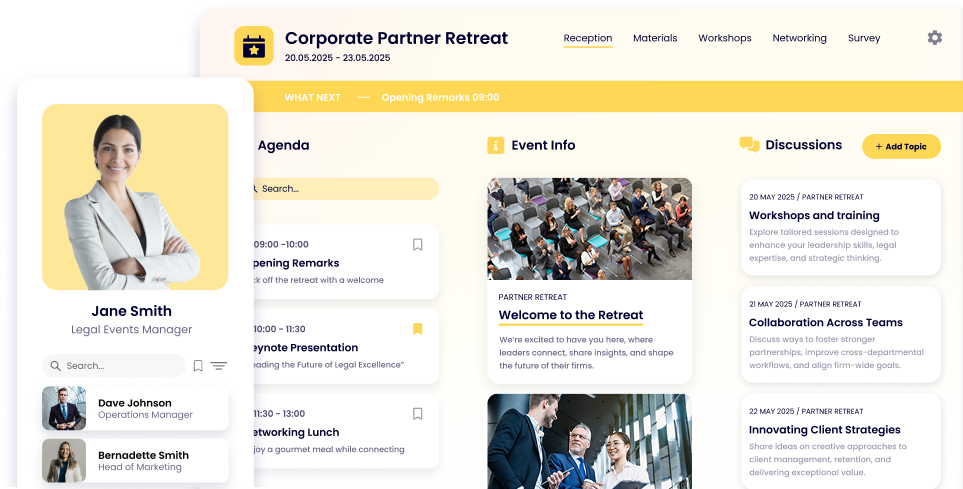Corporate Event Planning: The Ultimate Guide (Free Checklist)

Lisa Broom | Head of Marketing

You just can’t cut corporate event planning short. Not in today’s highly competitive environment. Corporate events have become a cornerstone of business strategy for a reason.
Events build your network, brand, and company culture like nothing else.
So we’re bringing you a bunch of great insights to make your next corporate event the best it can be.
This comprehensive guide will teach you how to host a corporate event, ensuring your next business gathering is unforgettable.
Key Takeaways
- Understanding the fundamentals of corporate event planning.
- Key objectives and types of corporate events.
- Step-by-step guide to organizing a successful corporate event.
- Tips for maximizing attendee engagement and experience.
- Benefits of effective event planning.
- Utilizing technology and apps to enhance event planning.
- Free corporate event planning checklist.
What is Corporate Event Planning?
Corporate event planning involves organizing and managing events hosted by companies or organizations.
These events can range from small team-building activities to large conferences and trade shows . The goal is to create a structured and professional setting where business objectives can be met, whether it’s for networking, training, product launches, or company celebrations.
So, another way to answer, “What is corporate event management?” is to say: it’s an extremely varied role, one that creates gatherings that meet specific and general goals of a business.
Fundamentals of Corporate Event Planning
Key Objectives of Corporate Events
Corporate events serve various purposes, and understanding these objectives is crucial for planning:
-
Networking
- Networking is a primary objective of many corporate events, providing a platform for meaningful connections:
- Client Engagement: Strengthen relationships with existing clients and attract potential clients.
- Industry Connections: Meet industry professionals, partners, and competitors to stay abreast of market trends.
- Employee Interaction: Encourage interaction among employees from different departments, fostering collaboration and teamwork.
- Networking is a primary objective of many corporate events, providing a platform for meaningful connections:
-
Training and Development
- Training and development events are vital for employee growth and organizational success:
- Skill Enhancement: Workshops and seminars focused on improving specific skills relevant to employees’ roles.
- Professional Development: Opportunities for employees to learn about new technologies, methodologies, and industry standards.
- Leadership Training: Programs designed to develop leadership skills and prepare employees for managerial roles.
- Training and development events are vital for employee growth and organizational success:
-
Brand Promotion
- Corporate events are powerful tools for enhancing brand visibility and reputation:
- Public Relations: Generate media coverage and public interest in the brand.
- Customer Loyalty: Reinforce the brand’s commitment to quality and customer satisfaction.
- Brand Ambassadors: Leverage influential attendees to spread positive word-of-mouth about the brand.
- Corporate events are powerful tools for enhancing brand visibility and reputation:
-
Product Launches
- Launching new products or services through corporate events can significantly impact their market success:
- Market Awareness: Create awareness and excitement about the new product among potential customers.
- Immediate Feedback: Gather real-time feedback from attendees to refine the product.
- Sales Boost: Drive initial sales through event-exclusive offers and promotions.
- Launching new products or services through corporate events can significantly impact their market success:
-
Employee Engagement
- Employee engagement events are crucial for maintaining a motivated and productive workforce:
- Team Building: Activities designed to strengthen teamwork and collaboration.
- Recognition and Rewards: Events that celebrate employee achievements and contributions.
- Cultural Integration: Initiatives that promote the company’s values and culture, enhancing employee loyalty and satisfaction.
- Employee engagement events are crucial for maintaining a motivated and productive workforce:
By understanding and focusing on these key objectives, corporate events can be effectively planned and executed to meet the organization’s strategic goals.
What People Discuss in Forums
Discussions on forums like Quora often reveal common concerns and best practices in corporate event planning. Here are key points from a relevant thread discussing the ultimate checklist for organizing a successful event:
- Clear Objectives: Define the purpose and goals of the event to ensure all activities align with these objectives.
- Detailed Planning: Create a comprehensive plan covering all aspects of the event, from venue selection to attendee engagement.
- Budget Management: Establish a realistic budget that includes all potential expenses and allows for contingencies.
- Effective Communication: Maintain clear and consistent communication with all stakeholders, including team members, vendors, and attendees.
- Post-Event Evaluation: Conduct a thorough evaluation after the event to gather feedback and identify areas for improvement.
Types of Corporate Events
Corporate events vary in size and scope, each serving different purposes and requiring distinct planning approaches. Here are some common types:
Small Events
Team-Building Activities
- Enhance team cohesion through collaborative tasks.
- Activities may include obstacle courses, escape rooms, and problem-solving challenges.
- Foster better communication, trust, and cooperation among team members.
Workshops
- Focused sessions for skill development.
- Topics can range from technical skills to soft skills like leadership and communication.
- Often led by experts or industry leaders to provide valuable insights and hands-on experience.
Networking Mixers
- Informal gatherings to foster connections.
- Encourage interaction among employees, clients, and industry professionals in a relaxed setting.
- Can include activities like cocktail parties, happy hours, or casual meet-and-greets.
Midsize Events
Seminars
- Educational sessions with a specific focus.
- Designed to provide in-depth knowledge on a particular subject.
- Often feature keynote speakers, panel discussions, and interactive Q&A sessions.
Corporate Retreats
- Offsite events to strategize and build relationships.
- Combine business meetings with recreational activities.
- Aim to improve team dynamics, foster innovation, and create a sense of unity.
Product Launches
- Medium-scale events to introduce new products.
- Include product demonstrations, keynote presentations, and hands-on experiences.
- Attract media attention and generate buzz among potential customers.
Large Events
Conferences
- Large-scale gatherings for industry professionals.
- Feature multiple sessions, workshops, and networking opportunities.
- Serve as a platform for knowledge sharing, professional development, and industry collaboration.
Trade Shows
- Exhibitions to showcase products and services.
- Provide a venue for companies to display their offerings to a large audience.
- Include booths, demonstrations, and networking opportunities to connect with potential clients and partners.
Corporate Celebrations
- Major events celebrating company milestones.
- Mark significant achievements such as anniversaries, mergers, or major project completions.
- Include formal dinners, award ceremonies, and entertainment to recognize and reward employees and stakeholders.
Understanding the various types of corporate events helps in selecting the right format to achieve specific business goals, ensuring the event’s success and maximum impact.
How to Organize Corporate Events
Objectives & Budgets
Start by defining the event’s purpose and setting a realistic budget. Consider the following:
- Objectives: Clearly outline what you aim to achieve, such as networking opportunities or product promotion.
- Budget: Include all potential expenses, from venue rental to marketing.
Timeline and Event Calendar
Creating a detailed timeline and event calendar is essential for staying organized:
- Planning Phase: Identify key milestones and deadlines.
- Event Day Schedule: Develop a minute-by-minute itinerary for the event day.
- Post-Event Follow-Up: Plan activities for after the event, such as sending thank-you notes.
Event Tech
When you consider the full range of tasks that these gatherings call for, it’s easy to see how technology boosts corporate event planning.
Looking to incorporate technology to streamline event planning and execution? A great corporate event app in particular is a must these days.
There are a whole suite of tools you can use:
- Registration Software: Simplifies attendee registration and ticketing.
- Event Management Platforms: Centralize planning tasks and communication.
- Mobile Apps: Provide attendees with event information and networking tools.
Attendee Engagement
Ensure your attendees are actively participating and enjoying the event:
- Interactive Sessions: Include Q&A sessions, polls, and discussions.
- Networking Opportunities: Design spaces and times for attendees to network.
- Gamification: Use games and contests to keep attendees engaged.
Attendee Experience
Focus on creating a positive and memorable experience:
- Comfortable Venues: Choose a venue that is easily accessible and comfortable.
- Quality Catering: Provide high-quality food and beverages.
- Entertainment: Include entertainment options like live music or guest speakers.
Event Marketing
Promote your event effectively to attract the right audience:
- Social Media: Use platforms like LinkedIn, Twitter, and Facebook to reach your target audience.
- Email Campaigns: Send personalized invitations and reminders.
- Partnerships: Collaborate with industry influencers and partners to expand your reach.
5 Ways Technology Is Changing Event Planning
In this video, Julius Solaris discusses how technology is transforming core processes in event planning:
- Venue Inspections (VR): Virtual reality allows remote venue tours, saving time and resources.
- Temp Staff: AI chatbots address common questions, enhancing attendee interaction.
- Check-in Personnel: Facial recognition and beacons streamline the check-in process.
- Q&A Sessions: Interactive tools like apps and social media walls replace traditional methods.
- Interpreters: Remote translation via apps offers cost-effective language support.
These advancements highlight the significant impact of technology on event planning.
Free Corporate Event Planning Checklist
To help you stay organized, here’s a comprehensive checklist for corporate event planning:
- Define Objectives: Clearly outline the goals of the event to provide direction and ensure all planning efforts align with the desired outcomes. This step sets the foundation for measuring the event’s success.
- Set a Budget: Establish a budget that includes all potential expenses. A well-defined budget helps manage financial resources effectively and prevent overspending, ensuring the event remains cost-effective.
- Choose a Date and Venue: Select a suitable date and book the venue. This ensures availability and convenience for attendees, contributing to higher attendance and a better overall experience.
- Create a Guest List: Identify and invite your target audience. Tailoring your guest list to the event’s objectives ensures that the right people attend, maximizing the event’s impact and networking opportunities.
- Plan the Agenda: Develop a detailed schedule for the event day. A well-structured agenda keeps the event organized and ensures that all key activities and sessions are adequately covered.
- Arrange Speakers and Presenters: Confirm the availability of key speakers. Securing knowledgeable and engaging speakers enhances the event’s value, attracting more attendees and providing high-quality content.
- Coordinate Catering and Entertainment: Plan food, beverages, and entertainment. Offering quality catering and entertainment enhances the attendee experience, making the event more enjoyable and memorable.
- Promote the Event: Use social media, email campaigns, and partnerships to market the event. Effective promotion increases awareness and attendance, ensuring the event reaches its target audience.
- Register Attendees: Set up a registration system and manage sign-ups. Streamlined registration processes improve the attendee experience and provide valuable data for planning and follow-up.
- Prepare Event Materials: Print badges, programs, and other materials. Organized and professional event materials contribute to the smooth running of the event and enhance attendee engagement.
- Rehearse: Conduct a run-through of the event to ensure everything runs smoothly. Rehearsals help identify and address potential issues, ensuring that the event proceeds without any major hiccups.
- Follow-up: Send thank-you notes and gather feedback from attendees. Post-event follow-up shows appreciation, fosters relationships, and provides insights for future event improvements.
Benefits of Effective Event Planning
Effective event planning offers numerous benefits:
- Cost Efficiency: Proper planning helps control costs and avoid unnecessary expenses.
- Improved Attendee Experience: Thoughtful planning enhances the overall experience for attendees.
- Increased Engagement: Well-organized events encourage active participation and networking.
- Positive Brand Image: Successful events boost your company’s reputation and visibility.
5 Tips to Hosting Your Next Corporate Event
If you want to organize a corporate event like the best in the business, it takes learning the finer points from the best.
Here are some expert tips for hosting a corporate event:
- Start Early: Begin planning well in advance to ensure all details are covered. So many elements are made significantly less stressful when given lots of lead time, including managing corporate travel.
- Delegate Tasks: Assign responsibilities to team members to streamline the planning process.
- Stay Flexible: Be prepared to adapt to last-minute changes and challenges.
- Engage Attendees: Use interactive elements to keep attendees engaged throughout the event.
- Evaluate Success: Conduct a post-event evaluation to assess what worked well and what can be improved.
How Can an App Help with Your Corporate Event Planning?
Using a corporate event planning app can greatly enhance your efforts through:
- Centralized Management: Manage all aspects of the event from a single platform.
- Real-Time Updates: Provide attendees with real-time information and updates.
- Enhanced Communication: Facilitate communication between organizers and attendees.
- Data Collection: Gather valuable data on attendee behavior and preferences.
Want to find a great app for the next time you’re hosting a corporate event? Check out our list of Cvent alternatives here!
Get Started: Make Your Next Corporate Event the Best Yet
Ready to elevate your corporate event planning? Start by implementing the strategies and tools outlined in this guide. With careful planning, effective use of technology, and a focus on attendee experience, you can create unforgettable events that achieve your business goals.
Book a free discovery call to learn more about Fliplet’s corporate event management software.
FAQs
What are the most common mistakes in corporate event planning?
Common mistakes include inadequate planning time, unclear objectives, poor budgeting, and neglecting attendee engagement.
How can I ensure attendee engagement during a corporate event?
Engage attendees with interactive sessions, networking opportunities, and engaging activities like games and contests.
What are the best practices for budgeting a corporate event?
Set a realistic budget, track all expenses, and include a contingency fund for unexpected costs.
How do I handle last-minute changes or emergencies during an event?
Stay flexible, have a backup plan, and ensure clear communication among the planning team and vendors.
What should be included in a post-event evaluation?
Assess the event’s success against objectives, gather attendee feedback, and identify areas for improvement.
How can I make my corporate event more sustainable?
Use eco-friendly materials, reduce waste, and choose sustainable vendors and venues.
What are the latest trends in corporate event planning?
Trends include hybrid events, virtual reality experiences, personalized attendee experiences, and sustainability initiatives.
How do I choose the right vendors for my event?
Research vendors, check references, compare quotes, and select those who align with your event goals and budget.
What are some innovative ideas for corporate event activities?
Consider activities like escape rooms, virtual reality experiences, live polling, and interactive workshops to keep attendees engaged and entertained.
By following these guidelines and utilizing the provided tools and tips, you can master the art of corporate event planning and ensure your next event is a resounding success.




